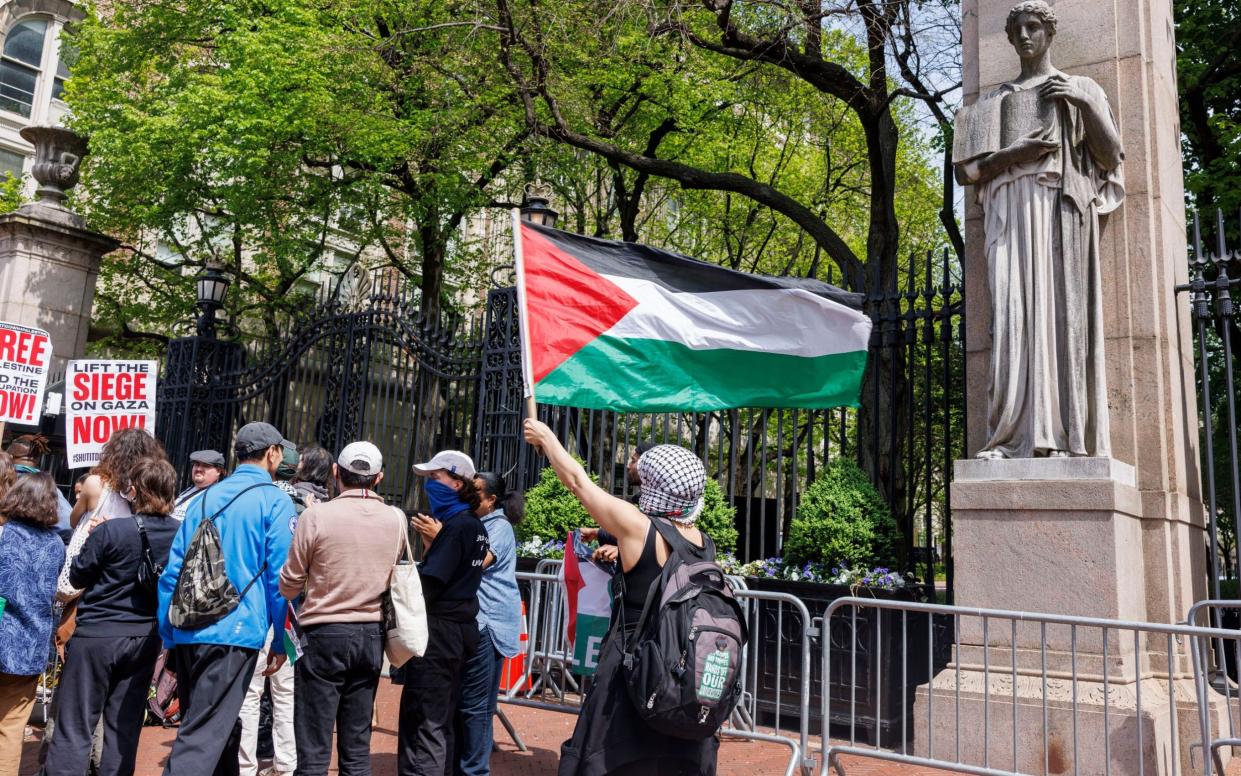The BBC is hiding the toxic truth about anti-Israel protests

For the latest evidence of the BBC’s failure to take anti-Semitism seriously, look no further than the corporation’s reporting of the campus protests at Columbia and other American universities. It goes without saying that we all have the right to protest. But it is abundantly clear that what is taking place on these campuses is a great deal more toxic, ugly and racist. Violence, intimidation and threats against Jewish students and teachers have been a daily occurrence.
At Columbia, there appears to have been no attempt to hide the anti-Semitism at the protest sites. Captured on video, protesters screamed the following at two Jewish students outside the campus gates: “Never forget the 7th of October.” “That will happen not one more time, not five more times, not 10 … but ten thousand times.” “The 7th of October is going to be every day for you!” On American soil, at a place of learning, Jewish people faced threats of a massacre. The spectre of pogroms, long thought part of the history of Jewish people, not their present, had returned.
The same is true at other American universities. At UCLA, things got so bad that pro-Palestinian demonstrators created a checkpoint to stop Jewish students from entering campus. The denial of access to education on grounds of race should be condemned by us all, but many of the campus protesters are selective in their activism when it comes to human rights. For them, anti-Semitism does not count.
The scale of racism against Jews on campuses is such that Joe Biden felt forced to intervene. Warning of an alarming surge of anti-Semitism, he said: “Silence is complicity. Even in recent days, we’ve seen harassment and calls for violence against Jews. This blatant anti-Semitism is reprehensible and dangerous – and it has absolutely no place on college campuses, or anywhere in our country.”
Yet reading the BBC’s online reporting of the protests, you would often have little idea that racism against Jews is loud and proud and Jewish students and teachers are experiencing something truly horrendous.
A BBC News article first published on April 26, titled “What do pro-Palestinian student protesters at US universities want?”, speaks volumes through what it left out until it was apparently updated. This “explainer” did not make a single mention of anti-Semitism at the protests. The tone of the report was also instructive. Protesters were made to sound like young heroes, carrying forward the torch of the Occupy Wall Street movement and the anti-apartheid demonstrations of the 1980s. The bias – and lack of interest – in anti-Semitism could not have been clearer.
It is hard to understand how this is possible from a news organisation that claims to be impartial and repeatedly asserts that it takes anti-Semitism as seriously as any other form of racism.
The same is true of a BBC report on May 2 titled “Columbia University community ‘shattered’ after police raid”. The tone of the article is one of sympathy for the protesters. Issues as serious as whether the cafeteria will fully re-open are deemed worthy of careful reporting. Racism against Jews is not. Nor is the violence and law-breaking that led to the police decision to intervene.
If anyone believes that these are isolated failures, the BBC News live feed page on the US campus protests are revealing. On May 2, this page was updated 58 times over the course of more than 10 hours. The experience of racism by Jewish students was covered in just one post, 30 minutes before the page closed. Despite hours of detailed and continuous coverage, it appears that BBC News felt that anti-Semitism was just not that important.
There is a simple test one can apply to this coverage. Had the poisonous racism on display at these protests been directed at the black or Muslim community, would BBC reports make little or no reference to it? The answer would – quite rightly – be no. The racist abuse would be front and centre of the story. It would be treated with the due prominence and sensitivity it deserves. It would be headline news, at the very heart of the coverage.
Yet racism against Jews is deemed barely worthy of mention in these BBC reports, if at all. As Biden noted, silence is complicity when it comes to anti-Semitism. And again here, the BBC’s silence is an act of complicity. All this adds to the growing list of BBC failures on anti-Semitism and anti-Israel bias since the October 7 massacres. It is hard to imagine that the vast majority of members of Britain’s Jewish community will ever forget it.
Danny Cohen was the director of BBC Television from 2013 - 2015

 Yahoo News
Yahoo News 
